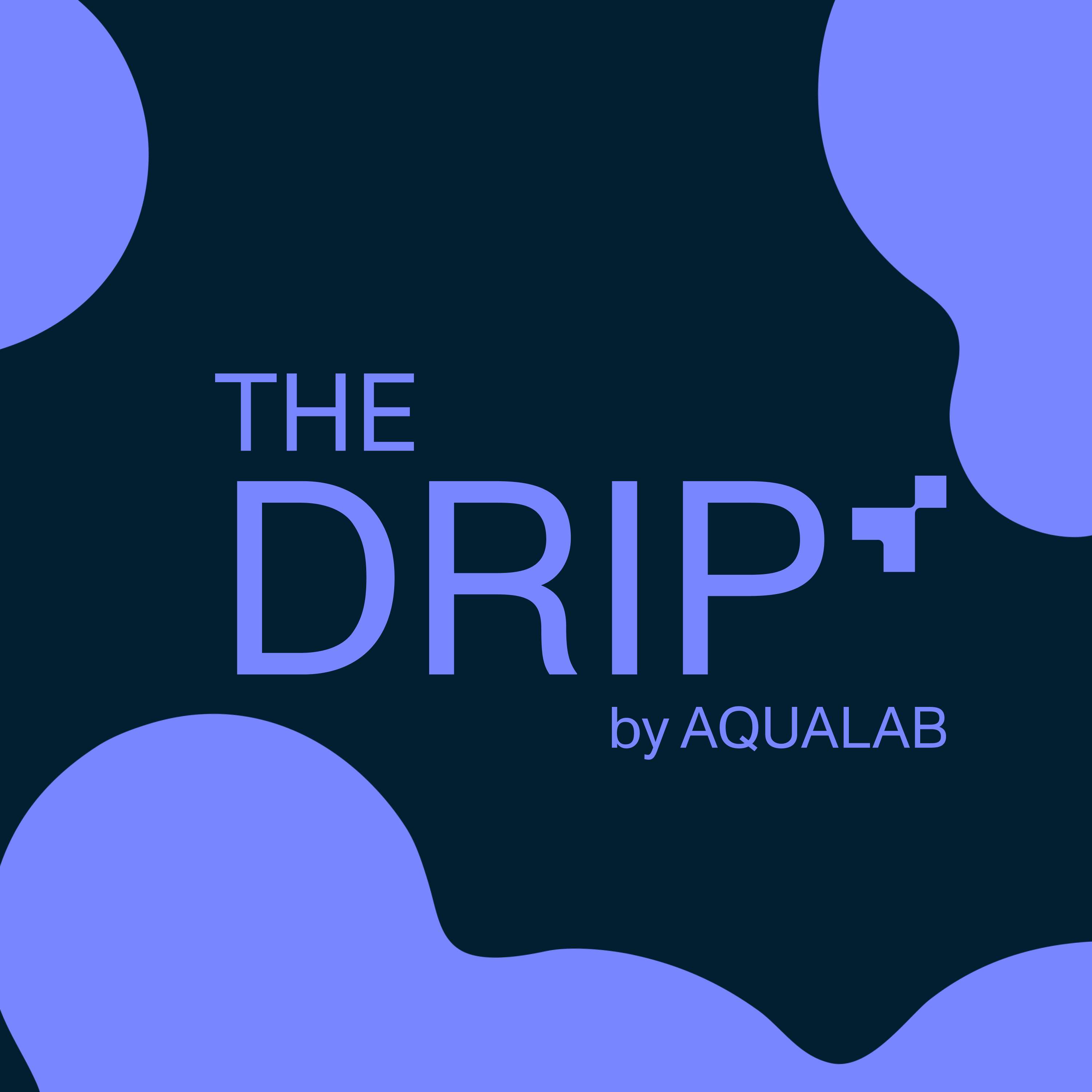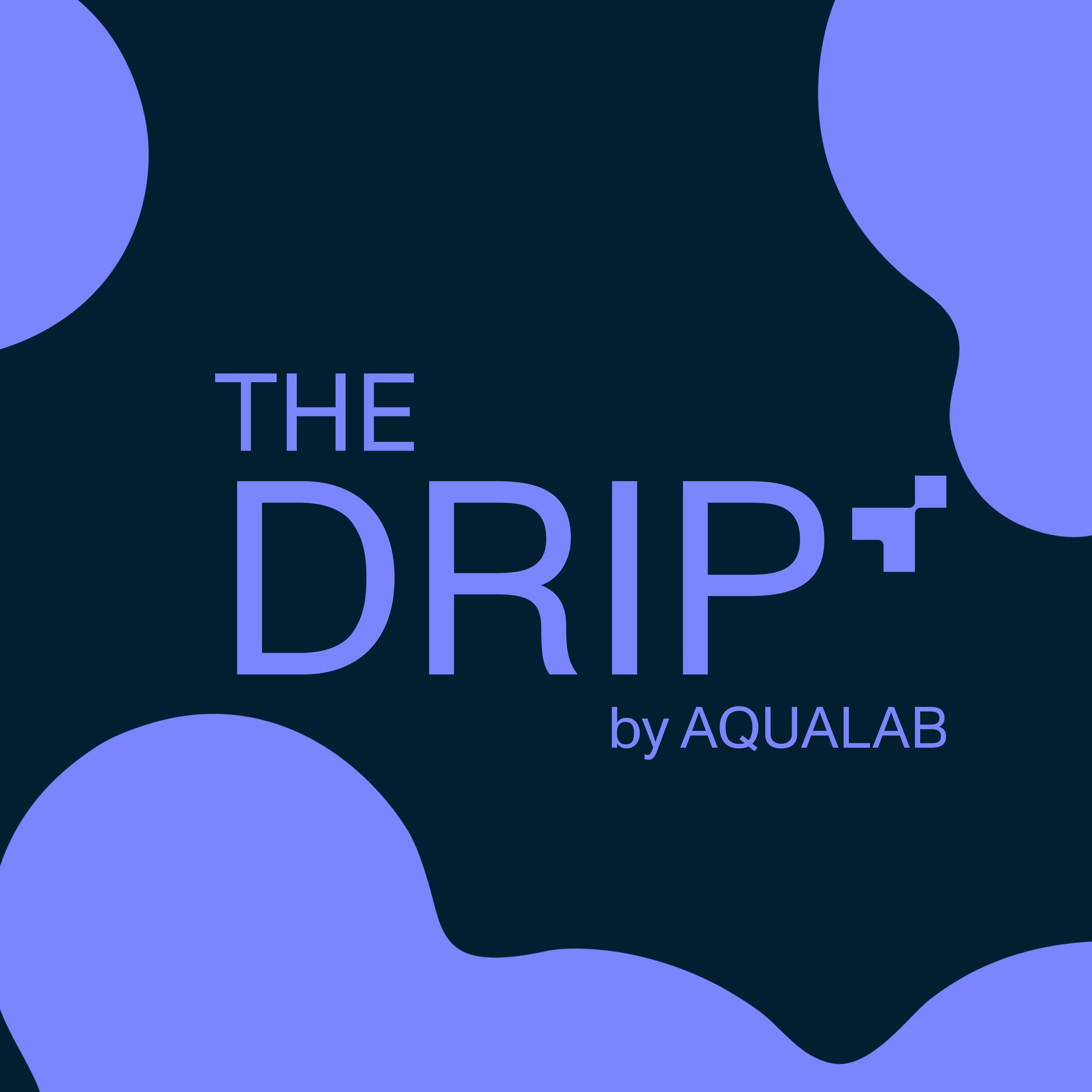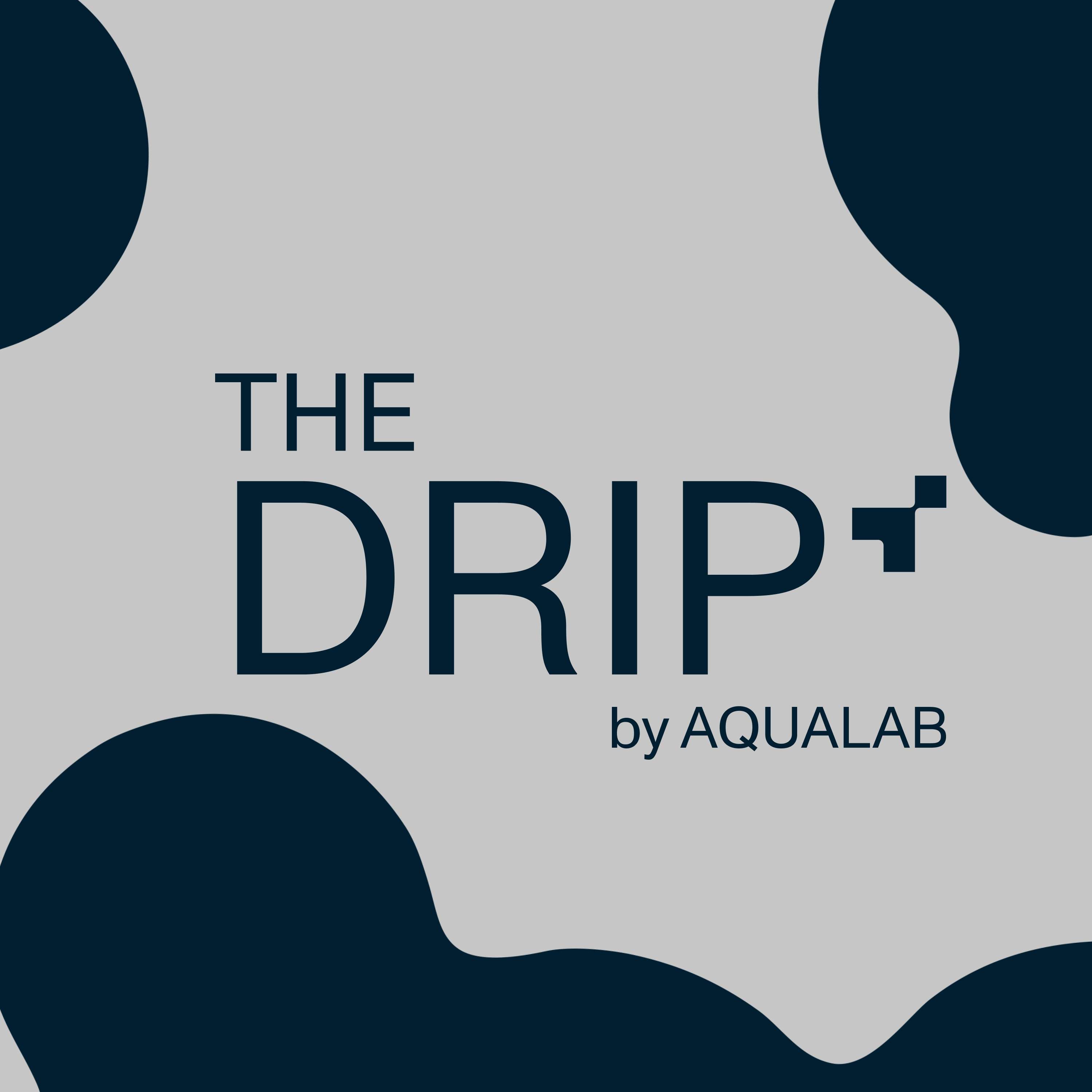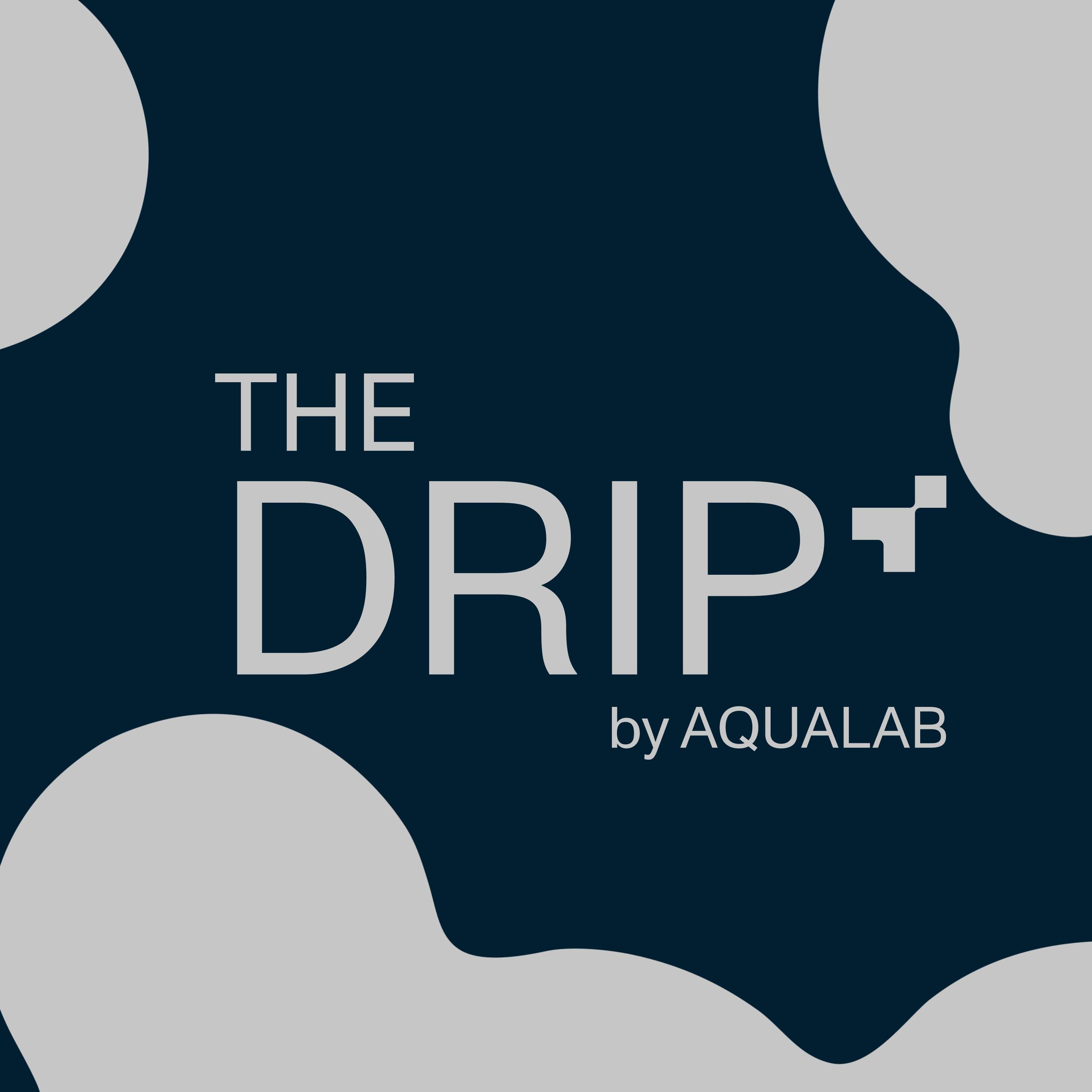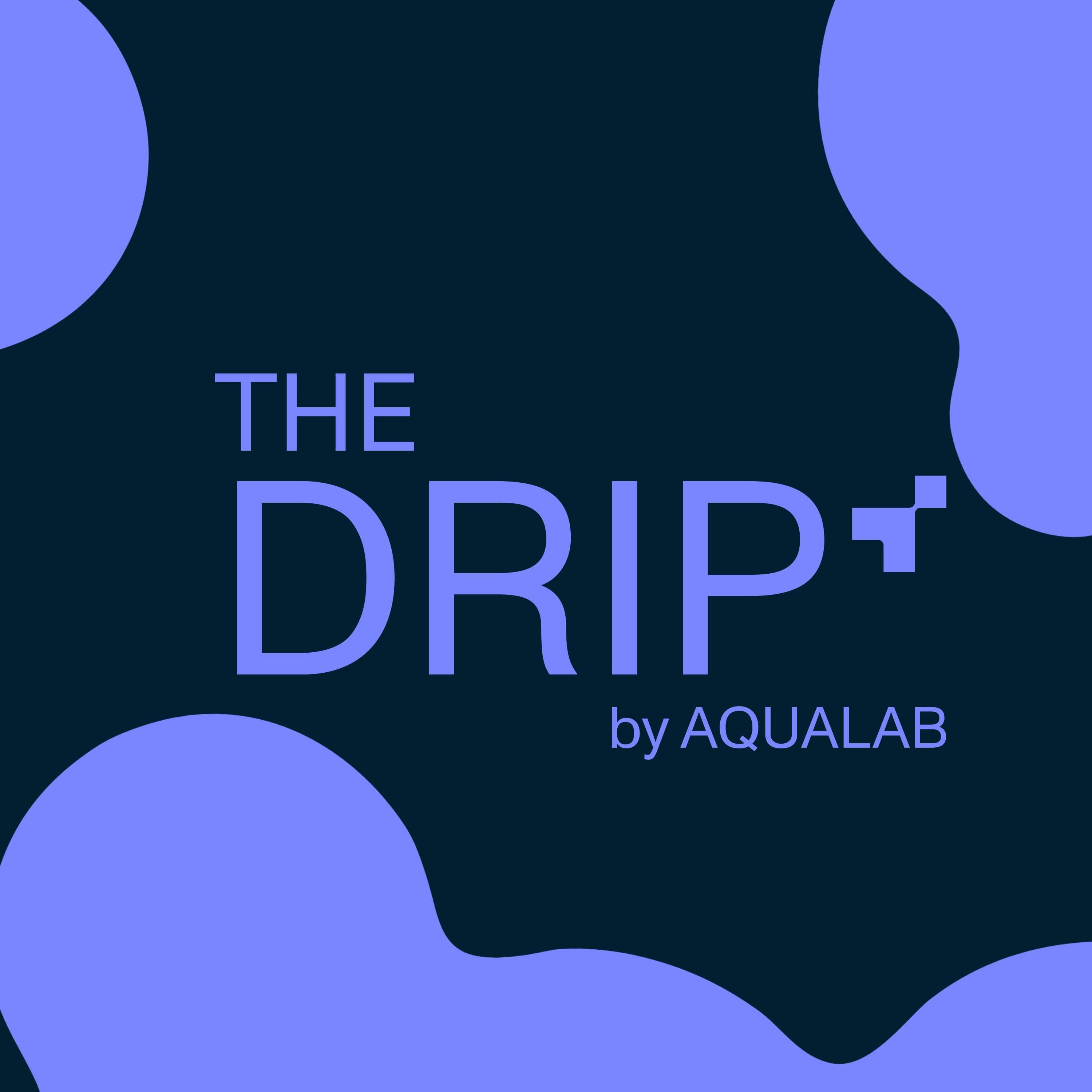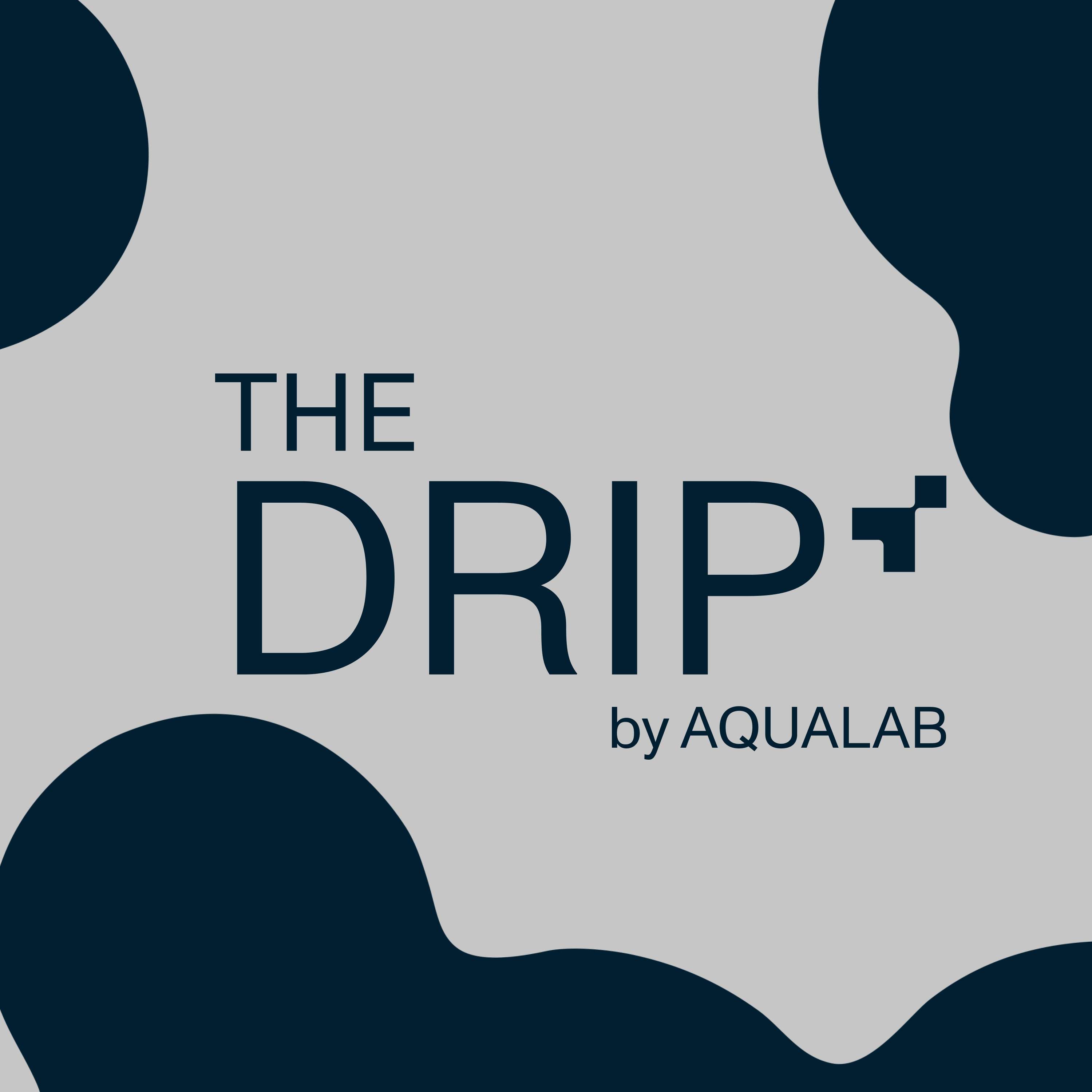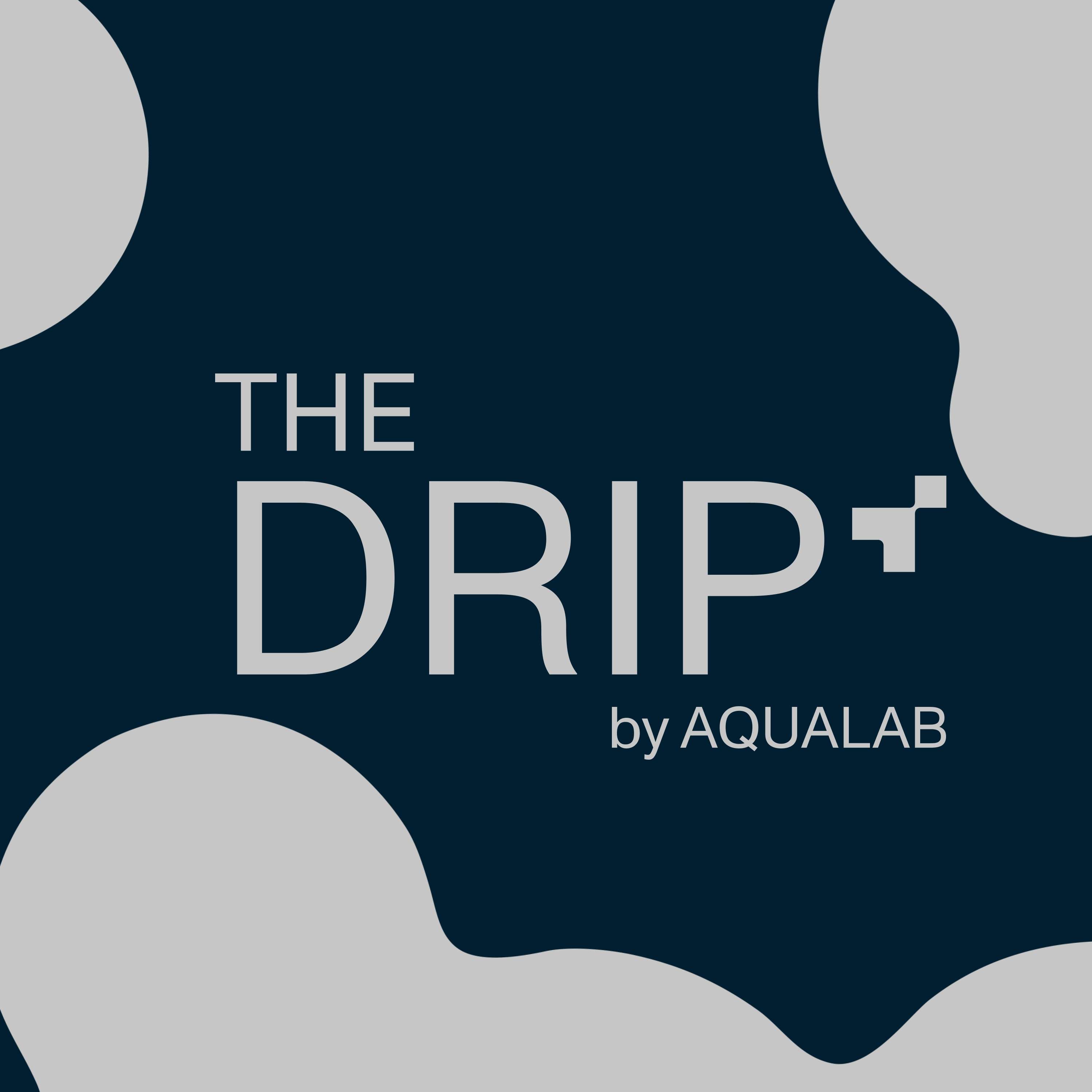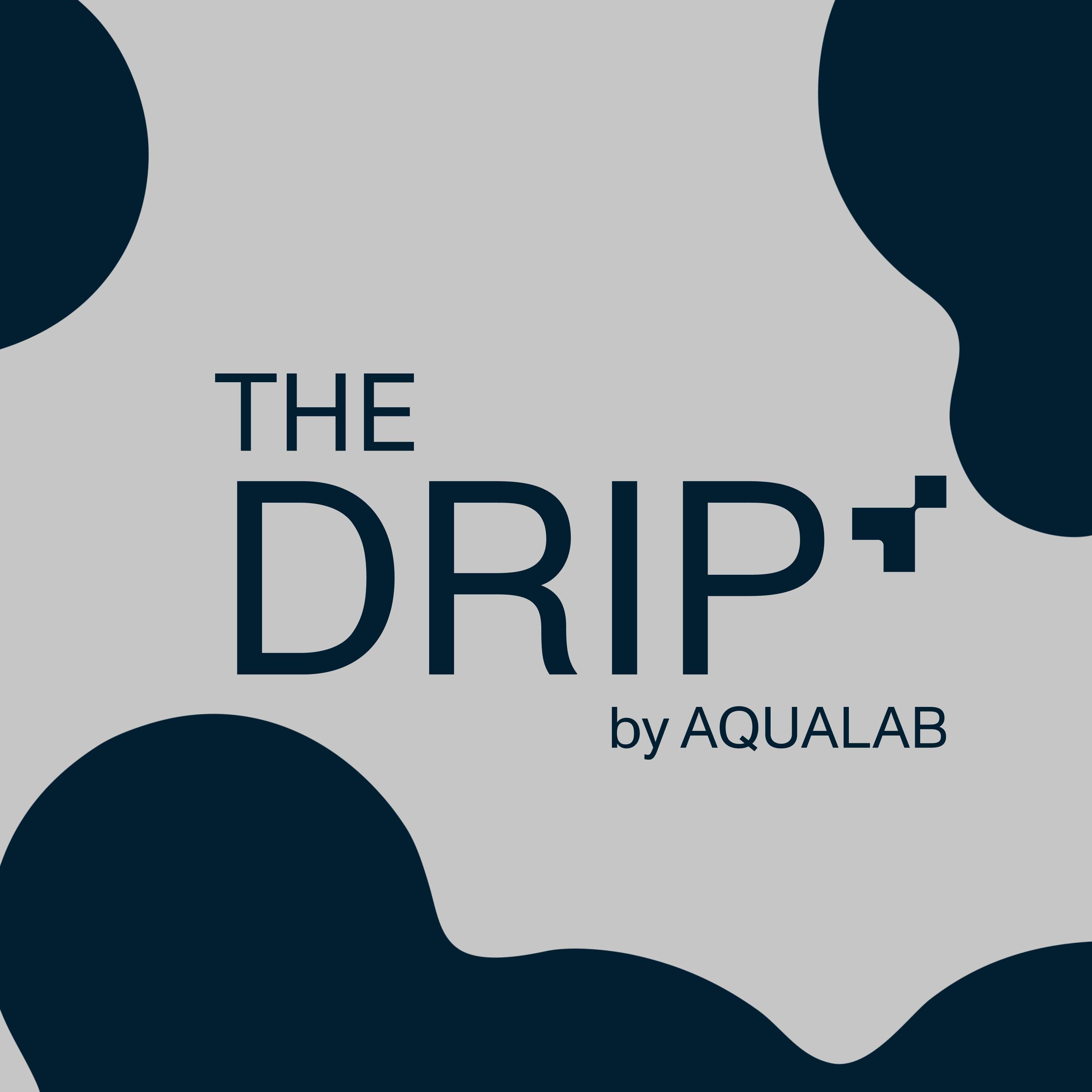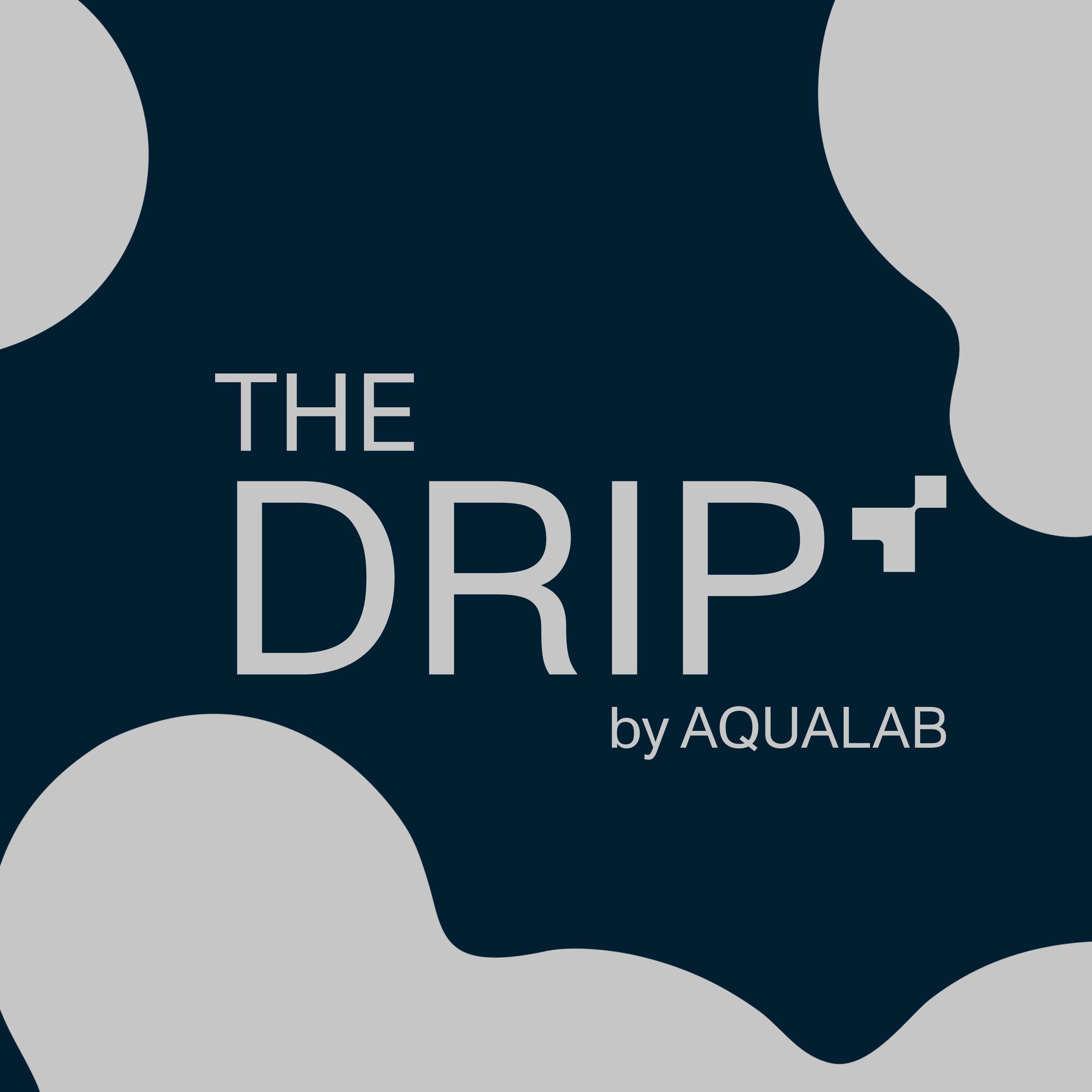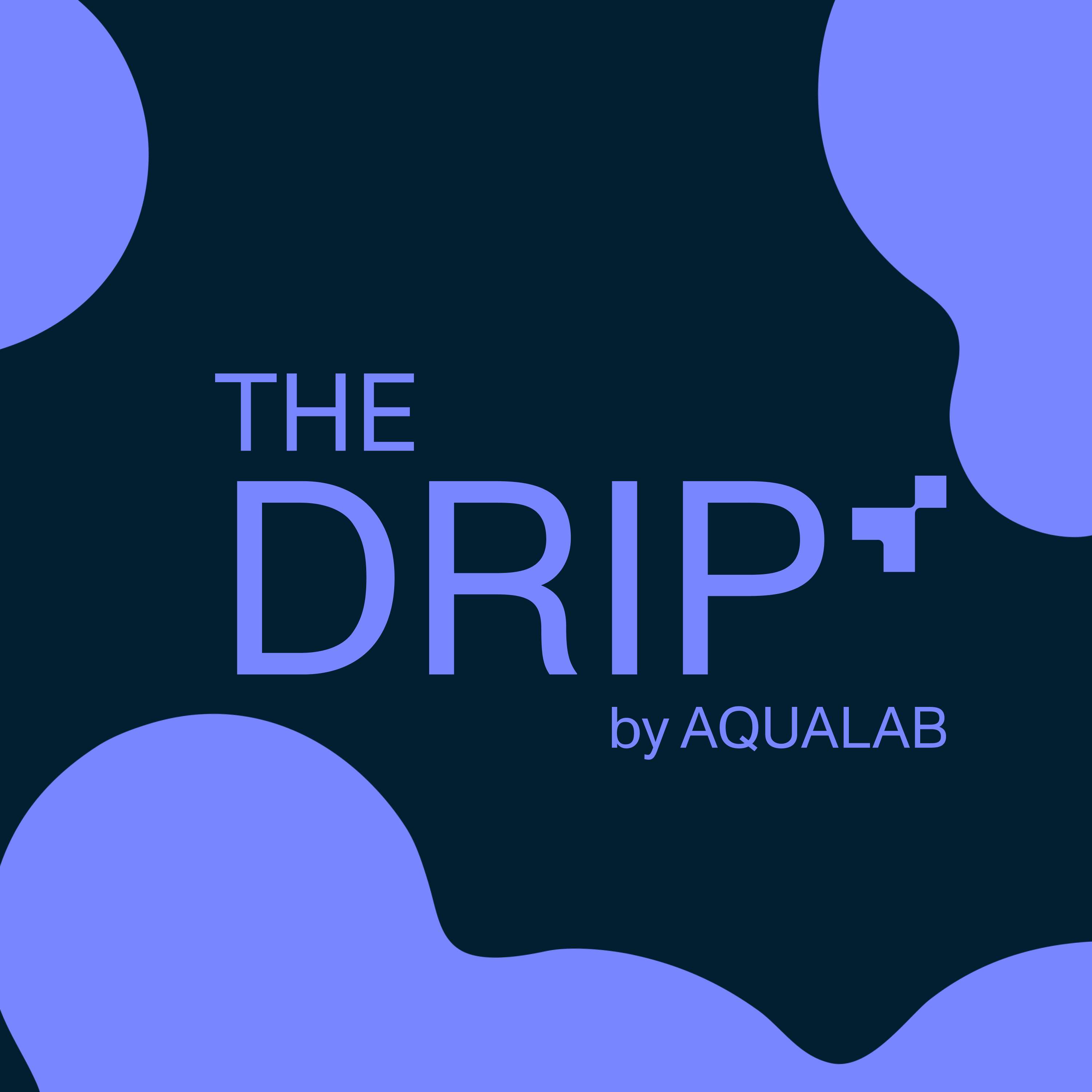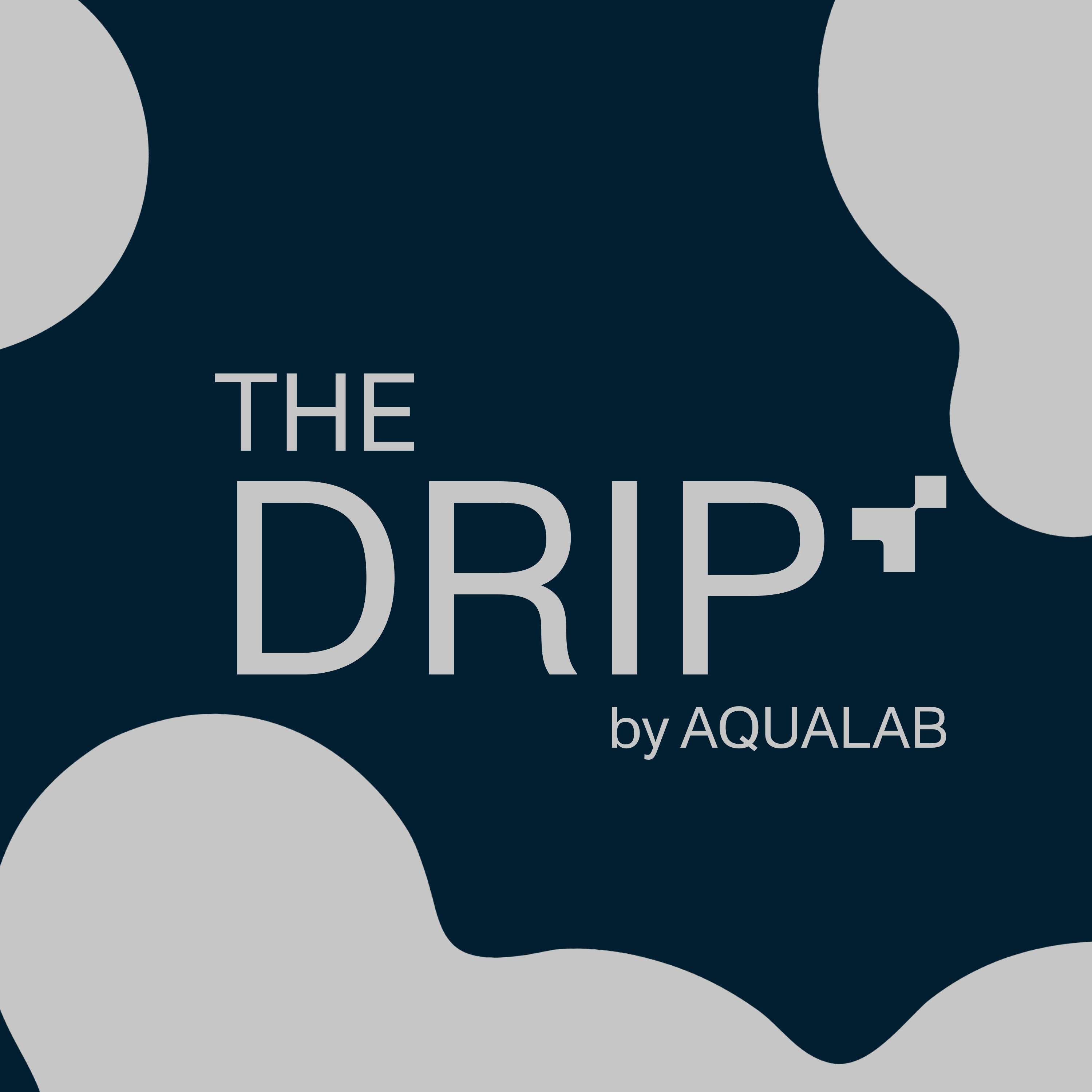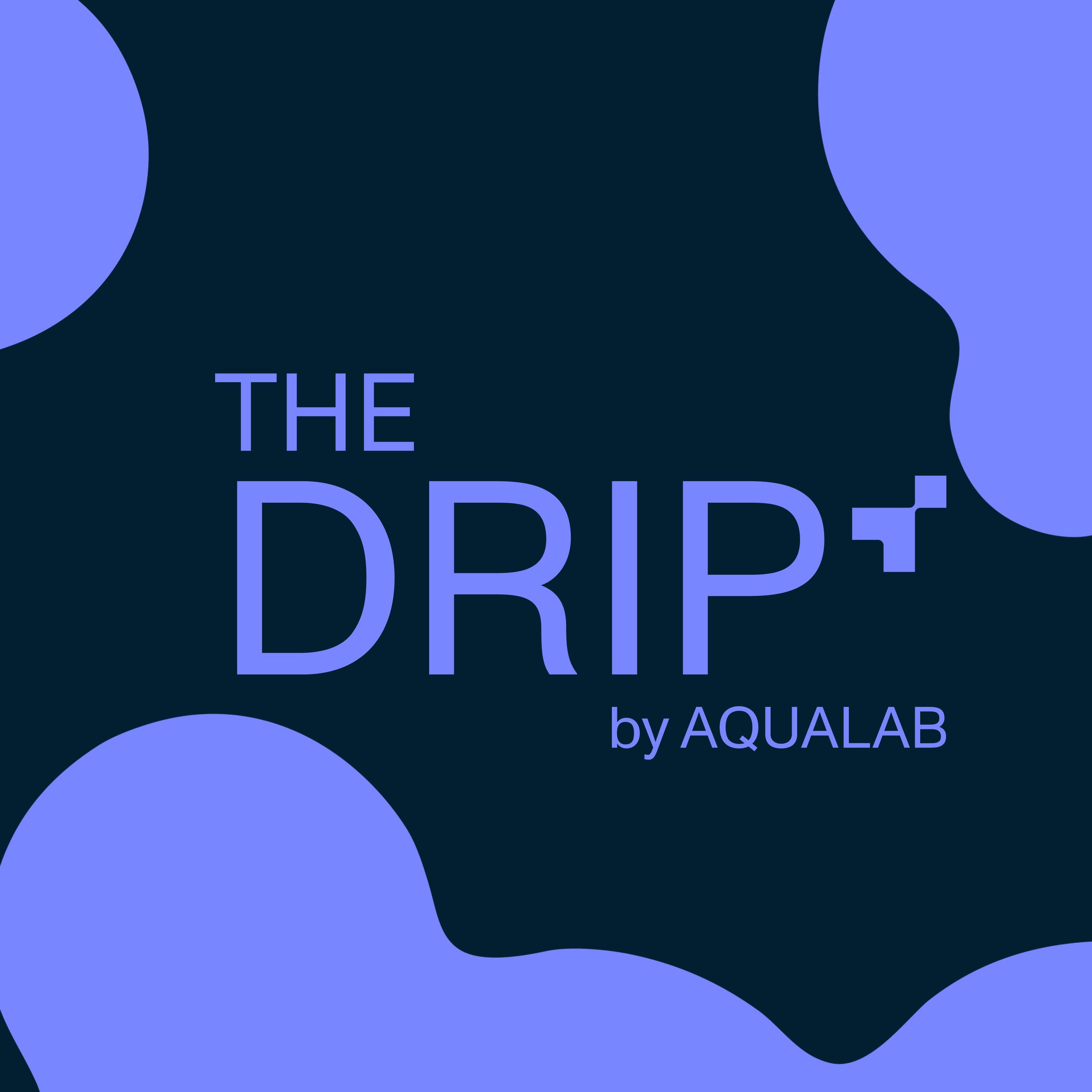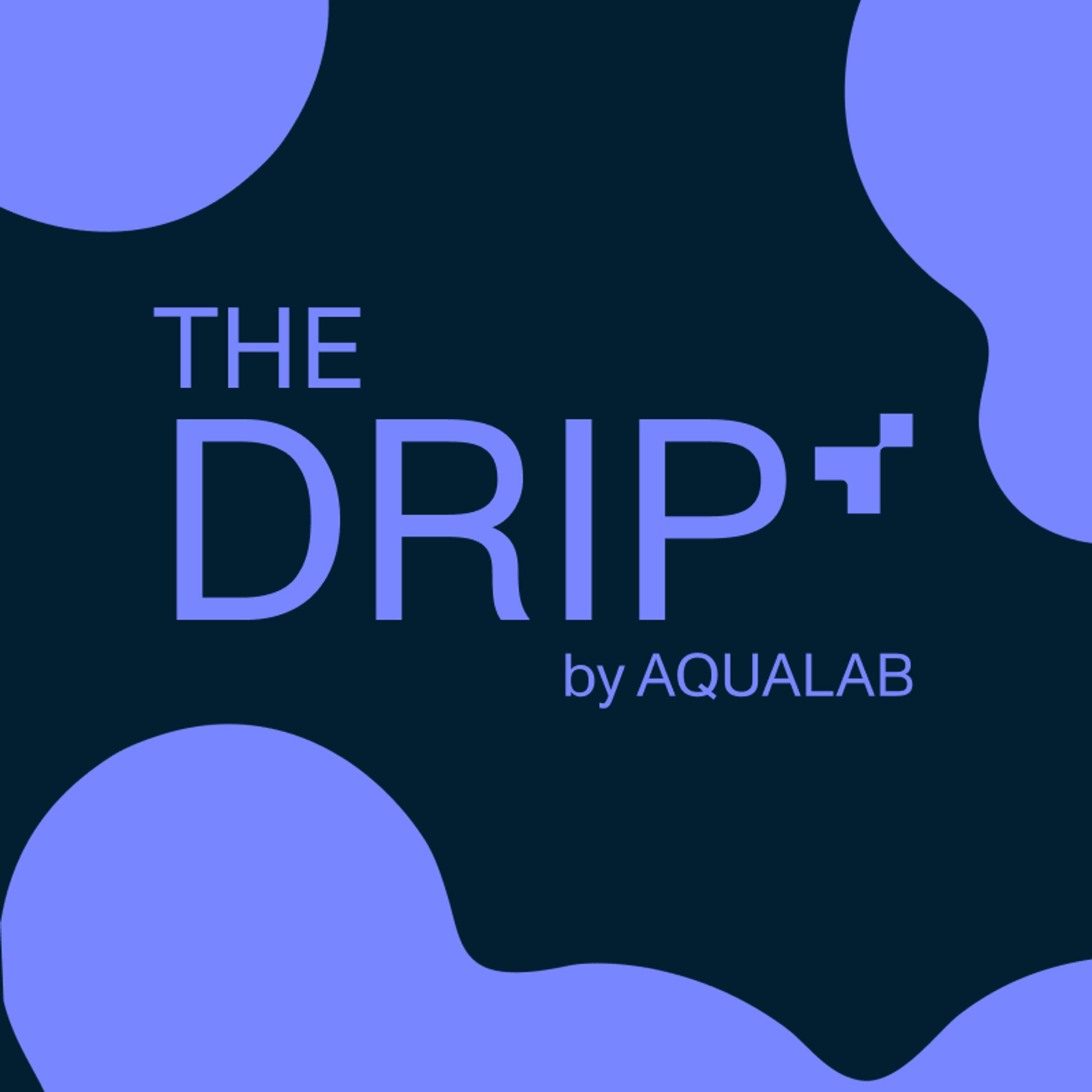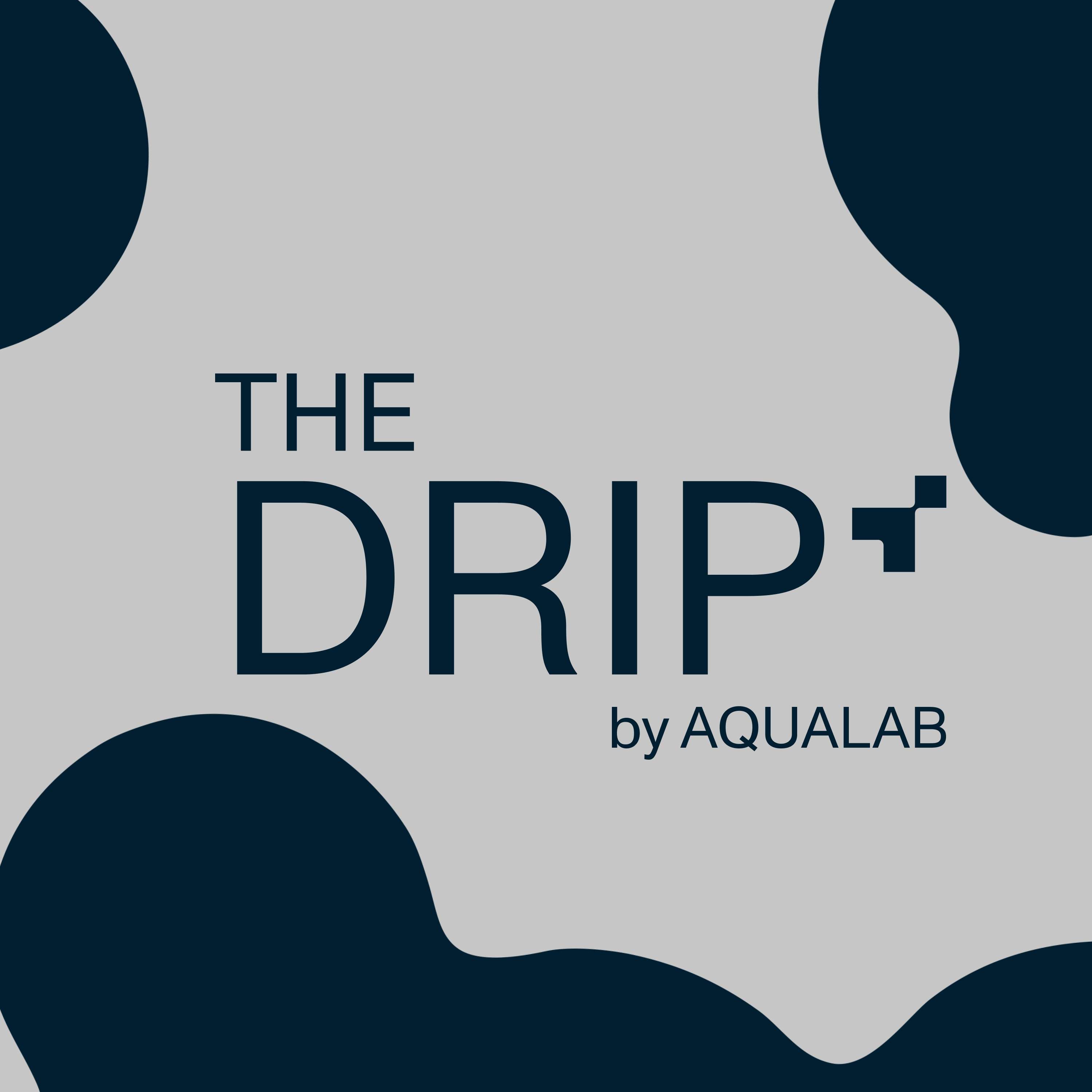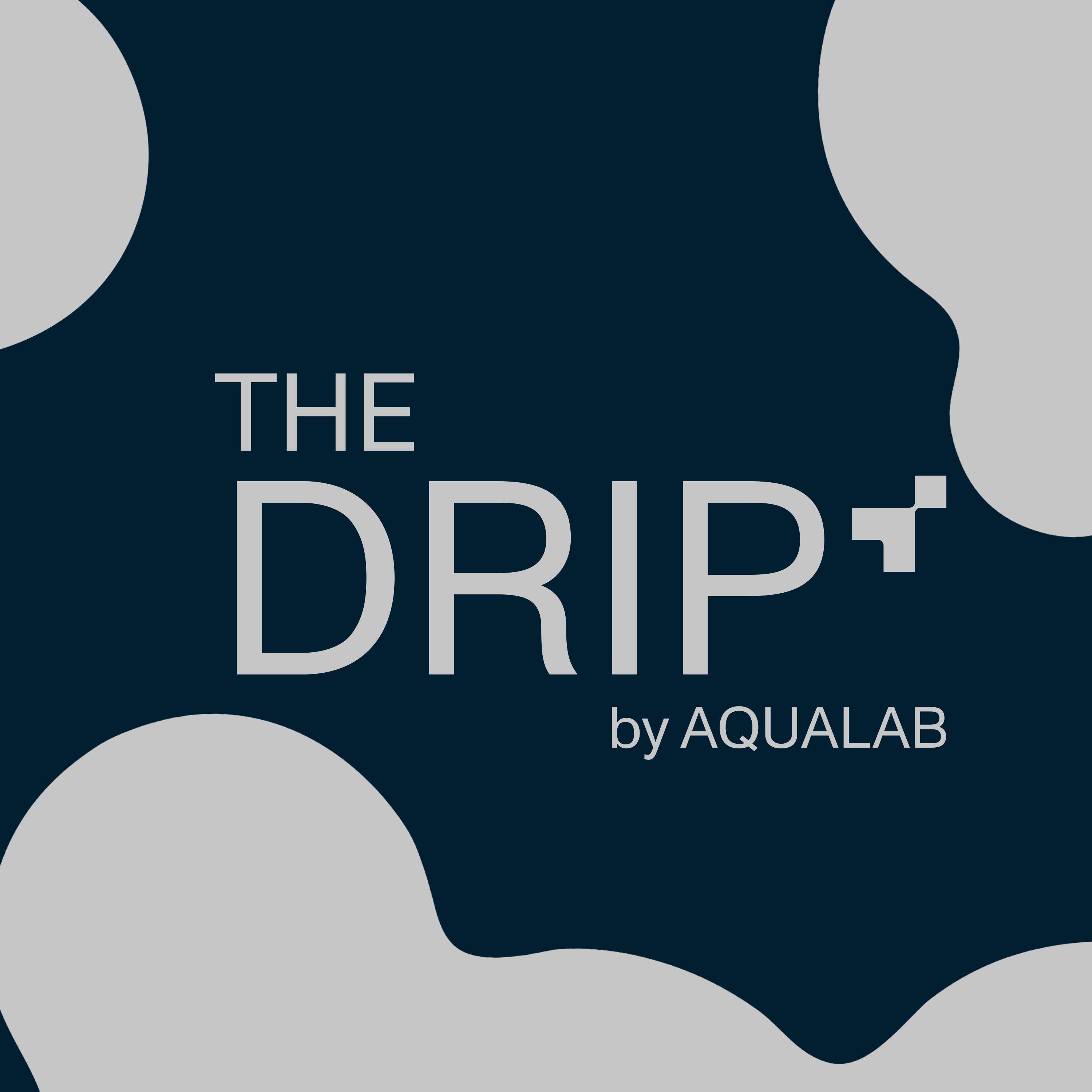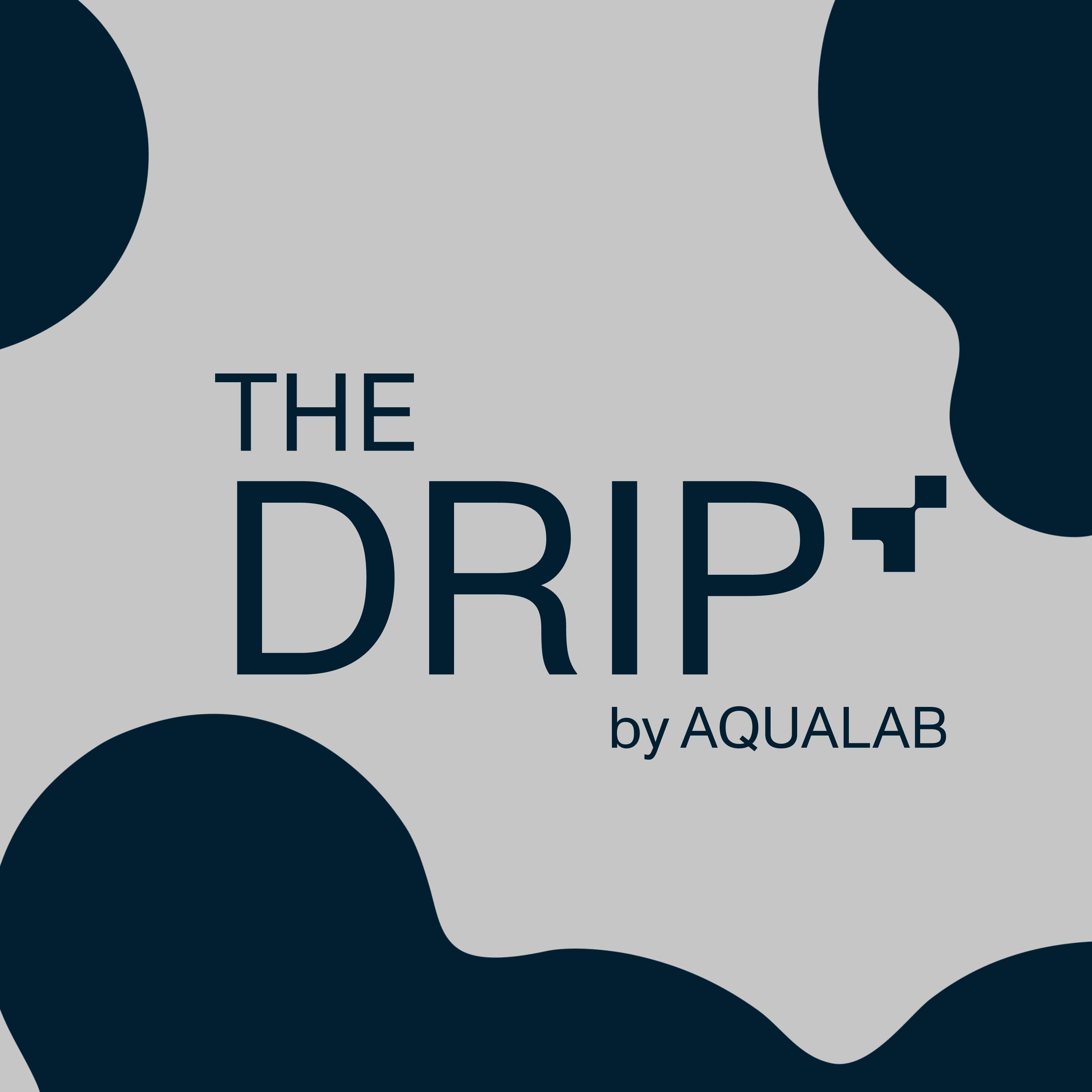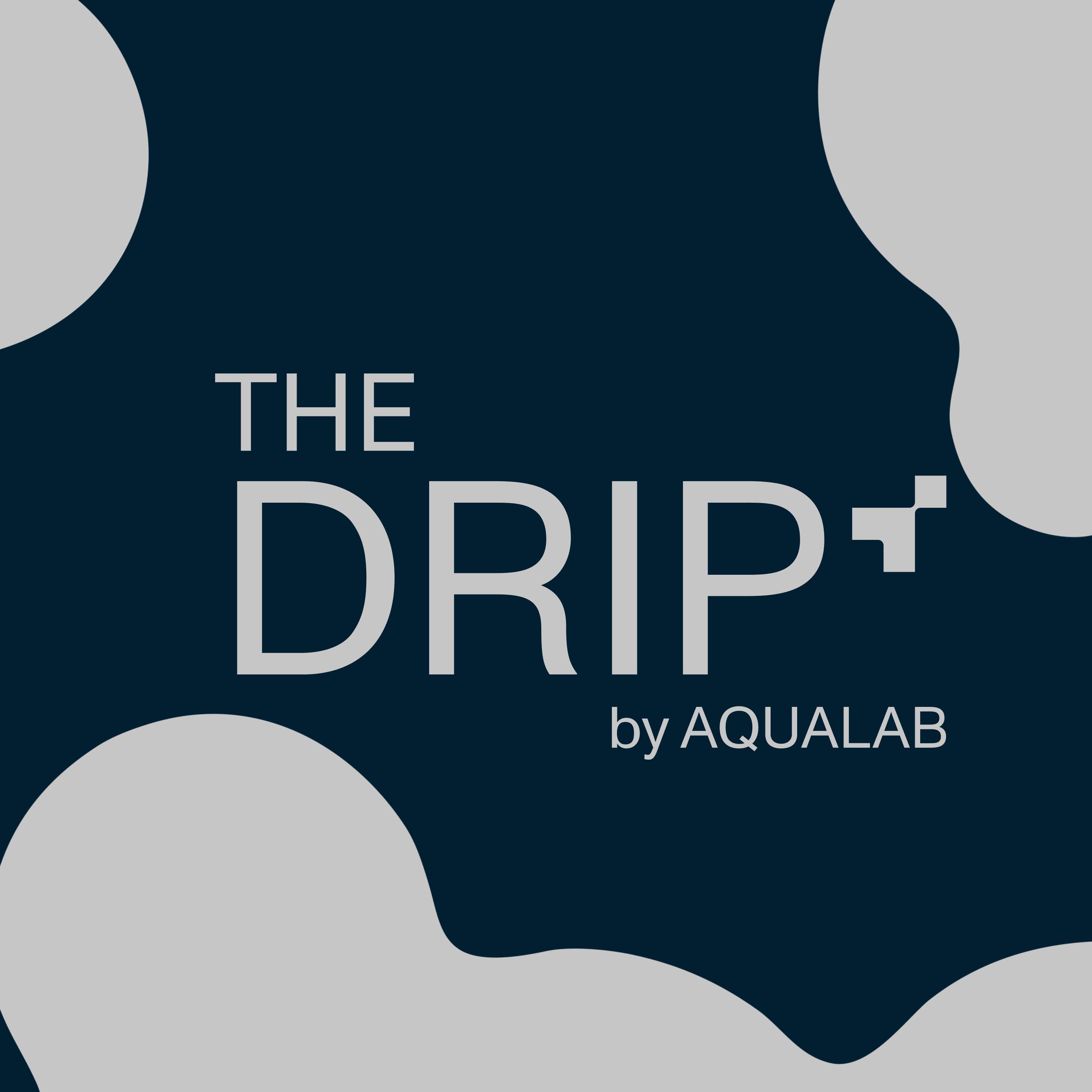Discover The Drip by AQUALAB
The Drip by AQUALAB

The Drip by AQUALAB
Author: Zachary Cartwright, Ph.D.
Subscribed: 5Played: 113Subscribe
Share
© 2025 Addium, Inc.
Description
Welcome to The Drip (formerly Water in Food), where we keep your mind hydrated with some science, music, and a mantra. I'm your host, Zachary Cartwright, lead food scientist at AQUALAB by Addium
Hosted by Zachary Cartwright, Ph.D.
Lead FOOD Scientist at AQUALAB
https://www.aqualab.com/
Hosted by Zachary Cartwright, Ph.D.
Lead FOOD Scientist at AQUALAB
https://www.aqualab.com/
61 Episodes
Reverse
Upcycled Food: the Climate Solution Sitting in Your Trash with Emily Lafferty and Amanda OenbringWhat if the future of food isn’t about creating more, but wasting less? In this episode of The Drip, we sit down with Amanda Oenbring, CEO of the Upcycled Food Association, and Emily Lafferty, Director of Supply Chain at Seven Sundays, a breakfast brand rewriting the rules of what ends up on your plate.Together, they’re part of a movement turning food system “waste” into something far more valuable: a solution. We go deep on the science, the systems, and the surprising innovations behind upcycled ingredients. Think of it as ingredient alchemy: transforming by-products into breakfast, and inefficiencies into impact.In this episode, you’ll hear about:What counts as “upcycled”? The big problem with food waste – and the greatest opportunities for innovationReal-world examples: from by-products to breakfast The challenges of processing upcycled foodsPractical ways to plug into the upcycled food revolutionJump to:(00:07) Upcycling 101: What it really means(00:54) Meet Emily Lafferty and Amanda Oenbring(03:42) What is upcycled food, exactly?(05:09) Food waste: The hidden giant(07:26) Upcycled ingredients in action(09:10) Tech hurdles and how to solve them(18:57) This episode’s song recommendation.(19:34) This episode’s mantra.Featured Artist and Song:Pyaar by TroyboiLinks mentioned in this episode:Amanda Oenbring on LinkedInEmily Lafferty on LinkedInUpcycled Food AssociationSeven SundaysThe Highwomen by Crowded Table, music was chosen by AmandaSunday Vibes by Masego, music was chosen by EmilyConnect with the showAQUALABZachary Cartwright, PhD
Laura Lampa is a scientist turned communicator and the founder and CEO of LML StoryLab Consulting. She translates complex scientific concepts into compelling narratives that resonate with wider audiences. On this episode of The Drip, Laura outlines why some groundbreaking scientific innovations struggle to capture public attention and how the art of storytelling can be the key to bridging this critical gap.In this episode, you’ll hear about:Key principles for translating science into stories.Using analogies to make science relatable.Strategies to improve communication in companies.Balancing accuracy and engagement in communication.Trends shaping the future of technical communication.Jump to:(00:53) Introduction to storytelling in science(03:46) Key principles for effective communication(07:22) Simplifying technical topics with real-world examples(11:53) Improving internal communication in companies(22:20) This episode’s song recommendation.(23:12) This episode’s mantra.00:00 "Communicating Breakthroughs: Science Storytelling"05:20 From Jargon to Relatable Science09:49 Effective Layered Communication Strategy12:52 Navigating Uncertainty in Mergers16:02 Effective Communication Drives Future Sales17:17 Content Trends: Visuals and Transparency20:59 Aqualab: Communicating Scientific InnovationsFeatured Artist and Song:Found Your Love by GrizLinks mentioned in this episode:Laura Lampa on LinkedInLML StoryLab Consulting"Just Can't Get Enough" by Depeche Mode, music was chosen by Laura LampaConnect with the showAQUALABZachary Cartwright, PhD
Ali Alwattari from Kraton Corporation has been working in product innovation for over 33 years, spanning industries from consumer goods to biotechnology and energy. His passion lies in integrating the human dimension and storytelling into scientific work, accelerating innovation and tackling challenges from the lab to the market. He joins The Drip to share his creative process and reflect on the unique products he's developed over his career.In this episode, you’ll hear about:How phenomena like the surface tension of water can drive innovation across industriesBalancing reasoning and logic with creativity, termed as "realistic imagination"Stories detailing the development of unique products like artificial spider silk and waterproof mascaraHow looking to nature and unrelated industries can inspire breakthroughs … and practical advice for those starting in product innovationJump to:(00:53) Ali's journey in product innovation across diverse industries.(03:46) The significance of the human dimension in scientific work.(07:22) Realistic imagination's role in innovation.(11:53) Ali's creative process and examples of innovative projects.(25:47) The future of innovation in the food industry(29:59) Resources Ali recommends(36:44) This episode’s song recommendation.(37:29) This episode’s mantra.Featured Artist and Song:Ease My Mindy by Chris LakeLinks mentioned in this episode:Kraton Corporation‘Disruptive Innovation' by Clayton Christensen'Rules for Revolutionaries' by Guy Kawasaki‘Entrepreneurs in High Technology' by Dr. RobertsViva La Vida by Coldplay, music was chosen by Ali AlwattariConnect with the showAQUALABZachary Cartwright, PhD00:00 Reusable Skills Drive Success04:26 Empathy and Emotion in Innovation08:46 Translating Concepts into Scientific Terms11:40 Nature-Inspired Water-Repellent Textiles15:52 Innovative Mascara Formulation Insights18:57 Dimples Revolutionize Gel Adhesion20:16 Shaving Gel Chemistry Evolution23:17 Simplified Product Development Framework27:00 Need-Driven Innovation in Food Industry32:31 "Professionalizing Innovation and Mentorship"35:46 "Product Innovation & Music Groove"37:49 Strength Over Struggle
Anđela Martinović holds a PhD in Food Systems from the University of Milan, specializing in probiotics and gut health. As a co-founder and program development coordinator at epiSTEMe Hub, she advances science, innovation, and technology with a focus on Montenegro. Angela joins The Drip to explore the complexities of probiotics, from production to their journey in the human GI system, and the role multidisciplinary research plays in this field.In this episode, you’ll hear about:Definition of probiotics and key production/ regulation challengesStages of production and importance of probiotic survival and functionalityRole of water activity in preservation and gut survival challengesAngela's PhD insights on probiotics and Montenegro's marketEmerging trends, future directions, and AI in probioticsJump to:(00:53) Understanding the definition and challenges of probiotics.(03:46) Overview of the probiotic production process.(07:22) Importance of water activity in probiotics' journey through the gut.(09:52) Angela’s PhD research insights on probiotic survival and functionality.(13:46) Analyzing the probiotic market in Montenegro.(18:10) Future directions and emerging trends in probiotics(26:05) This episode’s song recommendation.(26:45) This episode’s mantra.Featured Artist and Song:Push the Tempo by Sub FocusLinks mentioned in this episode:Anđela Martinović’s workAnđela Martinović on LinkedIn‘Uncovering the Probiotic Supplement Landscape: Market Offerings, Sales Patterns, and Future Forecasts Using Machine Learning Approach - A Case Study of Montenegro’ by Anđela Martinović et. al (2024)Spread Your Wings by Queen, music was chosen by Anđela MartinovićConnect with the showAQUALABZachary Cartwright, PhD00:00 Probiotic Survival and Functionality05:04 Optimizing Probiotic Production Factors07:03 Ensuring Probiotic Stability: Key Factors11:45 Streptococcus Thermophilus' Urase Activity Reduction14:59 Enhancing Standards and Analyzing Sales18:10 Multidisciplinary Collaboration Key to Probiotic Innovation20:31 Emerging Trends in Probiotics26:17 "Push the Temple" Review27:07 "Releasing Toxicity: The Drip"
Abigail Thiel is a Food Scientist and YouTuber of ‘Abbey the Food Scientist’. She is a postdoctoral researcher at Wageningen University in the Netherlands, focusing on food quality and design, with a particular interest in ice cream microstructure, healthier fat alternatives, and sustainable food production. She joins The Drip to delve into the fascinating world of ice cream science, from its microstructure to the intricacies of creating healthier and more sustainable sweet treats.In this episode, you’ll hear about:What are the ice cream terms "variegates" and "inclusions”?Understanding the healthier fats in ice cream.Creating a food science YouTube channel.Precision fermentation: milk proteins from yeast.00:00 Ice Cream Texture Research Funding03:48 Started YouTube During Covid Lockdown08:40 Yeast-Based Milk Protein Production12:50 Abby's Food Science Courses Online15:31 Tackling Ice Cream Moisture Migration16:36 "Mesmerizing Down Tempo Collaboration"Jump to:(00:53) How Abby started studying the science of ice cream through a USDA-funded project focusing on healthier fats.(03:46) The difference between variegates and inclusions and their importance in ice cream.(07:22) Balancing texture and health in food, and how it is a central theme in Abby's research.(11:53) Abby's venture into YouTube during the COVID-19 lockdown.(14:37) This episode’s song recommendation.(15:28) This episode’s mantra.Featured Artist and Song:Liftoff by Adastra and Bethany AgustinLinks mentioned in this episode:Abbey the Food Scientist – WebsiteAbbey the Food Scientist – YouTubeAbigail Thiel on LinkedInWageningen UniversityTaylor Swift, music was chosen by Abigail ThielConnect with the showAQUALABZachary Cartwright, PhD
Rachel Zemser from A La Carte Connections is a lifelong food scientist and consultant, dedicated to helping companies formulate and develop innovative food products. She is the author of "The Food Business Toolkit for Entrepreneurs" and holds degrees in food science from the University of Massachusetts Amherst and the University of Illinois. She has also attended culinary school in New York. Rachel joins The Drip by AQUALAB to explore the intricacies of food science consulting and entrepreneurial challenges in the food industry.00:00 Food Science Consulting Insights05:26 Entrepreneurs Vs. Big Brand Ingredients08:23 Designing a Custom Snack Bar13:02 Finding the Right Co-Packer14:14 Evaluating Co-Packer Suitability19:52 Preparing for Food Science Consulting21:14 Essential Skills for Food Consultants26:51 Food Science Consulting Expertise28:08 Song and Mantra for UpliftmentIn this episode, you’ll hear about:Rachel’s productivity hacks for self-employment success.Key tips for developing successful food products.Importance of water activity in dry foods.From Unilever to startups: Rachel’s career insights.Featured Artist and Song:Here with Me by MarshmelloLinks mentioned in this episode:A La Carte ConnectionsRachel Zemser on LinkedInStrange Currencies by REM, music was chosen by Rachel ZemserConnect with the showAQUALABZachary Cartwright, PhD
Dr. Carolyn Ross is a professor of food science and the director of the Washington State University School of Food Science. Her expertise covers sensory science, human perception of food textures, and the formulation of food products tailored to different populations. She joins The Drip to unpack texture's critical role in food acceptance and how this knowledge can be leveraged to design foods for diverse groups, from children with Down syndrome to older adults.00:00 Understanding food texture is crucial for acceptance.03:52 Down syndrome: 80% have eating and swallowing difficulties.07:35 Individual consumer needs shape food product development.10:16 Behavioral and preference studies on children, adults.16:02 Include targeted users in product design decisions.18:28 Water activity affects food consistency over time.21:49 AQUALAB collaboration enhances food sensory evaluation.23:53 Mantra: "I'm brave enough to climb any mountain."
Roman Libov is a food scientist specializing in plant-based foods and the incorporation of bioactive and psychoactive fungi into nutraceuticals. In this episode of The Drip, we learn about Roman’s journey from mental health to food science. We explore the challenges and innovations in incorporating psychoactive fungi into food products, the intersection of food science and psychedelics, and the promising future of fungi in the food industry and mental health therapeutics.In this episode, you’ll hear about:The rise of fungi in functional foodsStability challenges with psilocybin in beveragesThe future of psychedelic consumptionRegulatory challenges in consumer testing… and how fungi can improve public health outcomesJump to:(03:45) What is fungi's nutritional, medicinal, and sensory potential?(06:59) How psilocybin affects brain serotonin receptors and the “Entourage Effect”.(11:50) The importance of water activity for bioactive preservation.(13:25) How psilocybin stability is affected by environmental factors.(16:54) Why fungi are gaining popularity in health food.(22:28) This episode’s song recommendation.(23:26) This episode’s mantra.00:00 Fungi's future role: food, health, psychedelics, innovation.04:19 Fungi offer innovative, eco-friendly food solutions.08:36 Psychoactive fungi consumed as gummies or chocolates.10:27 Maintaining bioactive compounds' stability in food matrices.13:24 Psilocybin stability affected by processing and elements.16:54 Fungi increasingly popular in food and health.21:55 Sponsored content about fungi ingredients and music.23:52 Embrace authenticity and self-understanding; stay hydrated.Featured Artist and Song:Where You Are by John SummitLinks mentioned in this episode:Roman Libov on LinkedIn‘Virtual Reality as a Moderator of Psychedelic-Assisted Psychotherapy’ by Agnieszka D. Sekula, Luke Downey, Prashanth Puspanathan (2022)‘Psychoactive Fungi Formulations in Nutritive and Palatable Food Matrices: Options for Clinical and Non-clinical Use’ by Roman Libov (2023)‘Psychedelics and virtual reality: parallels and applications’ by Jacob S. Aday, Christopher C. Davoli, Emily K. Bloesch (2020)My Time by Sultan + Shepard, music was chosen by Roman LibovConnect with the showAQUALABZachary Cartwright, PhD
Lovedeep Kaur is an Associate Professor at Massey University in New Zealand. Her specialties include sustainable food processing technologies, circular food systems, and innovative food processing. She joins The Drip to unpack the cutting-edge innovations she is seeing that are transforming the way we process and enjoy meat. In this episode, you’ll hear about:Understanding new technologies like high-pressure processing and microwave-assisted thermal sterilizationHow enzymatic hydrolysis enhances flavors and nutritional value by breaking down proteinsCombining plant and animal proteins with 3D food printingHow less popular cuts like brisket are getting a makeover … and how these innovations will be able to lower the cost of meatJump to:(00:53) How sustainable technology boosts efficient, waste-free meat processing.(03:46) The ways of enhancing meat flavour, texture and safety.(07:22) Key technologies that improve protein digestibility and nutrient preservation.(11:53) Factoring in food safety and public health.(14:37) This episode’s song recommendation.(15:28) This episode’s mantra.Featured Artist and Song:Run Wtih Me by KaivonLinks mentioned in this episode:‘High pressure processing of meat: Effects on ultrastructure and protein digestibility’ (2016) by Lovedeep Kaur et al.Massey UniversityHass Hass, by Diljit Dosanjh x Sia, music was chosen by Lovedeep KaurConnect with the showAQUALABZachary Cartwright, PhD00:00 New tech aids sustainable meat processing practices.03:46 Innovative technologies enhance food flavor and texture.07:22 Advanced technologies improve protein digestibility and nutrient preservation.11:53 Technologies improve health, nutrition, and food safety.13:47 AQUALAB helps the meat industry with moisture control.
Alyssa Norris is the Director of Sustainability at Aether Fuels. She sits down with Zachary Cartwright to discuss how we can produce aviation fuel from waste, and how you don’t have to choose between seeing the world and saving it. Alyssa will shed light on the production, impact, and future of this fuel. We'll also discuss its current usage, the processes involved, and how it plays a crucial role in reducing greenhouse gas emissions and supporting a circular economy. In this episode, you’ll hear about:What is sustainable aviation fuel (SAF)?Suitability of SAF versus electric aircraft for long-haul flightsHow to overcome the unwanted presence of water in jet fuelInnovative aspects of Aether's technologyWhat does a Director of Sustainability do for a company like Aether? Jump to:(03:44) SAF is made from hydrogen, carbon, and waste materials.(08:41) Airlines will adopt sustainable fuel, therefore lowering costs.(10:25) Why electric flight tech lags and SAF infrastructure is more simple.(14:04) Being a startup leader focusing on sustainability and compliance.(16:07) Which flight operators are currently using SAF?(20:35) This episode’s song recommendation.(21:22) This episode’s mantra.Featured Artist and Song:Ice Cream Paint Job by SoDownLinks mentioned in this episode:Aether FuelsSAF Grand ChallengeDepartment of EnergySustainable Aviation Buyers AllianceEco-Skies AllianceEveryone Deserves The Chance To Fly by WICKED, music was chosen by Alyssa NorrisConnect with the showAQUALABZachary Cartwright, PhD00:00 SAF reduces emissions, fossil reliance, and aids sustainability.03:44 SAF uses hydrogen, carbon, and various waste sources.08:46 Increasing SAF adoption will reduce its cost.10:15 SAF enables existing infrastructure use, batteries are inefficient.14:03 Startup focuses on sustainability, compliance, and stakeholder engagement.16:05 Alaska and United boost sustainable aviation fuel initiatives.19:50 Aqualab sponsors moisture analysis in fuels discussion.
Ravi Karkara and Vinay Indraganti, from AI For Food Global Initiative, join the Drip to discuss their new book ‘The AI for Food Movement’. We'll explore how AI is transforming food production, from creating consistent culinary experiences to enhancing sustainability. Tune in as we address challenges like AI adoption fears and data integration, the role in flavor development and personalized dining, and manufacturing efficiencies. In this episode, you’ll hear about:Flavor and texture customization through AIThe use of AI in R&D, production, and logisticsRevolutionizing quality control in food production with computer visionHow AI ensures consistent and repeatable food experiencesEthical considerations in automationJump to:(03:39) How big data optimizes farming and food logistics.(08:25) Sustainability innovations in agriculture: AI, emissions and drones.(10:58) How AI enhances sensory neuroscience and flavor chemistry.(17:10) The AI vending machine which offers customizable drink combinations.(24:09) There is a need to promote positive AI perception in processed food.(26:26) Mastering AI involves data integration and artistry.(30:08) Building AI-skilled professionals for sustainable food production.(33:44) Establish boundaries, evaluate regularly, and address ethical implications.(36:08) Food's cultural, political, and religious dimensions influence meaning.(41:40) This episode’s song recommendation(42:24) This episode's mantraFeatured Artist and Song:Places to Be by Fred again..Links mentioned in this episode:SKALA for Moisture ControlAI For Food Global InitativeConnect with the showAQUALABZachary Cartwright, PhD
Matthew Moore is an Associate Professor at the University of Massachusetts, Department of Food Science who is recognized for his groundbreaking research on foodborne pathogens. In this episode, we’ll tackle the risks of influenza H5N1 jumping to mammals and debunk misconceptions about foodborne illnesses, especially noroviruses. We’ll also explore cutting-edge virus detection methods using magnetic liquids and nanopore technology, and discuss the impact of climate change on virus transmission. In this episode, you’ll hear about:Viral vs. bacterial foodborne illnessesHow do noroviruses survive the journey through your body?The impact of climate change on foodborne viruses and mycotoxinsCutting-edge work in virus detection and concentrationWhy policy matters when it comes to controlling outbreaks… and why it's not just cruise ships affected by norovirusesJump to:(05:56) Viruses must withstand harsh conditions to infect.(08:14) Key Nnorovirus research: viral entry, replication, and ongoing breakthroughs.(12:56) Using bacteria to capture viruses cost-effectively.(14:04) Engineering E. Coli for norovirus detection and collaboration.(17:08) Fingerprint norovirus to identify outbreaks accurately.(23:50) Researching virus resistance to disinfectants and application.(25:20) Students advancing magnetic liquids for virus detection.(29:05) How climate change and mycotoxins affect food safety.(33:01) Current H5N1 risk to humans remains low.(36:00) The guest’s favorite artist and song(38:34) Featured artist and song(39:13) This episode’s MantraFeatured Artist and Song:Falling Flying by GRiZLinks mentioned in this episode:University of Massachusetts, Department of Food ScienceDr Matthew Moore’s current researchOutstanding Young Scientist Award in honor of Samuel Cate PrescottCalculating Infinity by The Dillinger Escape Plan, music was chosen by Matthew MooreConnect with the showAQUALABZachary Cartwright, PhD
Mario Gonzalez Angulo is the HPP Food Applications Manager at Hiperbaric High Pressure Technologies. Curious about how your guacamole stays fresh? High Pressure Processing (HPP) is a non-thermal food preservation method that harnesses oceanic-level pressures to inactivate foodborne pathogens and extend the shelf life of various products… all while preserving their nutritional and sensory qualities. We’ll explore the history, application, and potential of this revolutionary technology, as well as its effects on the molecular level. In this episode, you’ll hear about:The journey of HPP from its first mention in 1899What food products are benefiting from HPP – from guacamole to baby foodWhy water activity needs to be between 0.97 and 1 for optimal HPP effectivenessHow the method keeps your food pathogen-free AND flavorfulHow the applications of HPP extend beyond foodJump to:(04:43) pH and water activity determine microbial inactivation.(06:54) How pressure affects weak bonds, not strong covalent bonds.(12:50) Why clostridium botulinum struggles to grow in coconut water.(16:54) The guest’s favorite artist and song(20:30) Featured artist and song(22:31) This episode’s MantraFeatured Artist and Song:Cheshmhaye Tameshki by Marjan Farsad, sung by Roodabeh DerakhshanianLinks mentioned in this episode:Hiperbaric High Pressure TechnologiesThe Scientist by Coldplay, music was chosen by Mario Gonzalez AnguloConnect with the showAQUALABZachary Cartwright, PhD
Subhendu Nayak is the Director of Formulation (Probiotics and Herbal) at Vida Herbs. He joins The Drip to talk about the complexities of manufacturing, from blending to storage, and the crucial role of water activity in maintaining probiotic potency. We'll also explore the nuances between CFU and AFU measurements and discuss innovative yet straightforward solutions. In this episode, you’ll hear about:Water activity in probioticsColony Forming Units (CFU) versus Active Fluorescent Units (AFU)Spore-forming, non-spore-forming, and next-generation typesManufacturing processes like blending, encapsulation, and packagingHow keeping solutions uncomplicated can lead to better success and innovationJump to:(03:39) How AW measures the vapor pressure ratio in foods.(08:01) Minimize water activity to prevent probiotic die-off.(10:12) Molecular sieves control water activity and maintain potency.(15:20) Preferred sugar alcohols for coolness.(17:34) Granular ingredients ensure better stick-pack sealing.(22:54) Water activity control in oil prevents decay.(25:39) Plate counting measures CFU per gram. (30:20) Viable but unculturable cell health benefits questioned.(32:41) The guest’s favorite artist and song(35:09) Featured artist and song(38:25) This episode’s MantraFeatured Artist and Song:Sometimes Somehow by Eric E.Links mentioned in this episode:Vidya HerbsOne Dance by Drake, music was chosen by SubhenduConnect with the showAQUALABZachary Cartwright, PhD
Marcus Washington is the co-founder of FSQA Help in Oklahoma. Marcus joins The Drip to address the challenges faced by emerging food brands, the importance of understanding regulations, and the role of consulting in maintaining compliance. He also shares his experiences managing a small farm, the science behind animal health, and his entrepreneurial journey of his own food business. In this episode, you’ll hear about:Understanding and complying with FDA and USDA regulations.A unique perspective on food safety from having managed a small farmThe science behind feeding farm animalsWhy local state regulations can be a lifeline for startupsHow to better integrate preharvest food safety knowledgeJump to:(05:48) Navigating food classification regulations.(07:40) Why is ensuring animal safety vital for food safety?(13:36) Key lessons from Grad school farm visits.(14:53) Promote food safety through farm relationships and volunteering.(20:13 Decision-making is like playing poker in life.(18:58) The guest’s favorite artist and song(23:24) Featured artist and song(24:22) This episode’s MantraFeatured Artist and Song:NRG by PiCO THE GUYOLinks mentioned in this episode:FSQA HelpHomemade Food Freedom ActPink Friday 2 by Nicki Minaj, music was chosen by Marcus WashingtonConnect with the showAQUALABZachary Cartwright, PhD
Transforming Invasive Plants into Valuable Resources – The Biochar Solution with Pratikshya SilwalPratikshya Silwal recently finished for PhD in agricultural economics from Oklahoma State University. She joins The Drip to share how biochar, a form of charcoal produced through pyrolysis, can be used as a sustainable additive in potting mixes. We'll uncover how it can replace conventional components, the size and growth of the global biochar market, and its environmental impact. Pratikshya also shares insights into her groundbreaking research on converting the problematic eastern red cedar tree into valuable biochar and discusses consumer willingness to adopt this innovative product. In this episode, you’ll hear about:What is biochar, and how is it produced through pyrolysis?The factors that are driving the growth of the global biochar marketHow biochar in soil contributes to the reduction of greenhouse gas emissionsPratikshya’s research on using the invasive eastern red cedar… and which other plant species can be used to produce biocharJump to:(01:05) What is biochar?(03:39) How the invasive eastern red cedar threatens ecosystems and agriculture.(07:32) Some studies show negative effects of biochar.(12:14) The power of the optimistic mindset: everything happens for the best.(14:44) Featured artist and song(15:46) This episode’s MantraFeatured Artist and Song:Midnight Thoughts by McNastyLinks mentioned in this episode:Oklahoma State University‘Role of biochar toward carbon neutrality’ by Liuwei Wang, Jiayu Deng, Xiaodong Yang, Renjie Hou and Deyi HouOne Love by Blue, music was chosen by Pratikshya SilwalConnect with the showAQUALABZachary Cartwright, PhD
Breanna Neff from brelixi, delves into the innovation of nanoemulsified technology in the cannabis space. As a certified food scientist and founder, she shares her expertise on the advancements of nano-infused edibles, the benefits of different cannabinoids, and her journey in creating functional cannabis products. We'll also explore the science behind fast-acting cannabis, the diverse consumer market, and how her company is overcoming social stigmas associated with edibles.In this episode, you’ll hear about:What are the different forms of cannabis edibles?How nanoemulsified technology enhances the bioavailability of cannabinoidsThe development approach of new flavors for brelixi productsHow the cannabis industry faces social stigmaEnsuring compliance with federal regulations for shippingJump to:(05:00) How brelixi offers fast-acting cannabis wellness products.(09:22) Turmeric's anti-inflammatory benefits and market research.(10:17) How small businesses can overcome challenges through networking.(13:21) The guest’s favorite artist and song(16:34) Featured artist and song(18:06) This episode’s MantraFeatured Artist and Song:RIGHT NOW by NASTY CATLinks mentioned in this episode:brelixiFeel Good Inc. by Gorillaz, music was chosen by Breanna NeffConnect with the showAQUALABZachary Cartwright, PhD
Marlana Malerich is the Co-Founder and Sustainable Food Systems Researcher at the Rooted Research Collective (RRC). Marlana, poised to begin her PhD at Sussex University, has spent the last six months focused on ultra-processed foods and plant-based meat alternatives. She joins the show to unpack the complexities of defining and understanding ultra-processed foods through systems like NOVA and Nutri-Score. In this episode, you’ll hear about:The NOVA nutritional framework vs the Nutri-score system The history behind hyper palatability of ultra-processed foods – and its link with tobacco companiesIssues with moisture sorting affecting shelf life and texturePros and cons between plant-based and animal-based productsBalancing your diet while navigating the complexity of food classification systemsJump to:(03:50) Negative effects of globally distributed junk food.(08:18) Focus on alternative proteins, and challenges with food advertising.(11:07) Media focusing on ultra-processed foods labeling.(14:38) Ultra-processed foods are designed for overconsumption.(20:07) Plant-based options vary in nutrition quality.(23:39 Reminding myself to appreciate being here alive.(26:50) Featured artist and song(29:09) This episode’s MantraFeatured Artist and Song:Deep Mind by ROBMONLinks mentioned in this episode:‘Nutrition and health. The issue is not food, nor nutrients, so much as processing’ by Carlos A Monteiro‘The Impact of Transnational ‘‘Big Food’’ Companies on the South: A View from Brazil’ by Carlos A Monteiro‘Ultra-processed foods: how functional is the NOVA system?’ by Véronique Braesco, et al'Hyper-Palatable Foods: Development of a Quantitative Definition and Application to the US Food System Database' by Tera L. FazzinoIs the Ultra-processed Food (UPF) concept useful, and for what goals?‘Ultra-processed food exposure and adverse health outcomes: umbrella review of epidemiological meta-analyses’ by Melissa M Lane et al‘Food Politics’ by Marion NestleAlabora (Foxall Pale Blue Remix) by Beyhude, music was chosen by Marlana MalerichConnect with the showAQUALABZachary Cartwright, PhD
Navigating Food Safety Challenges: Bruce Ferree’s 40-Year Career in Food ScienceBruce Ferree, a food safety consultant, unpacks the world of food safety and quality management. Bruce's career spans over four decades, encompassing meats, poultry, dairy, and aseptic processing roles. He’s a distinguished member of the Institute of Food Technologists and a former US Marine and cancer survivor. Bruce shares valuable insights from his vast experience in the food industry, the evolution of food safety culture, and the significance of consistency, continuous improvement, and prevention.In this episode, you’ll hear about:The key changes in the culture of food safety and quality over Bruce’s careerThe importance of CCP (Consistency, Continuous Improvement, and Prevention)Military discipline transferred to food scienceHow surviving cancer influenced Bruce’s perspective on life and workSome key strategies that professional organizations like IFT can adopt to effectively convey scientific information to consumersJump to:(05:03) Workers who take ownership of quality and safety.(07:14) Integration of quality teams for efficient collaboration.(12:39) Challenges in food safety mirror cancer survival.(17:09) Diverse food scientists unite in global organization.(19:13) Pesticides, heavy metals and public awareness.(25:00) Featured artist and song(25:57) This episode’s MantraFeatured Artist and Song:QUEMA by NASTY CATLinks mentioned in this episode:Institute of Food TechnologistsBang the Drum All Day by Todd Rundgren, music was chosen by Bruce Ferree.Connect with the showAQUALABZachary Cartwright, PhD
Digitizing Food Safety: Innovations in Middle East and North Africa with Fidele El AchkarFidele El Achkar is the visionary founder of FoodSight, an initiative aimed at revolutionizing the food industry in the Middle East and North Africa. By digitizing food safety and industry activities, Fidele seeks to modernize traditional practices, ensuring they align with global trends. FoodSight fosters collaboration among freelancers, international experts, and service providers, creating an ecosystem where stakeholders work together using a customized approach. In this episode, you’ll hear about:Addressing food safety issues in Lebanon and the MENA regionHow FoodSight is uniting industry stakeholders and creating job opportunitiesThe digitization of food industry activities and how it’s revolutionizing food safety and efficiencyAssisting producers with export and compliance issuesHow other regions around the world can learn from the success of FoodSightJump to:(05:19) How FoodSight aims to unite industry stakeholders and create job opportunities.(07:01) Assisting producers with export and compliance issues.(11:58) Experts fill out detailed profiles and questionnaires.(16:17) Repositioning FoodSights as a social enterprise and expanding globally.(19:44) This episode’s song.(21:40) This episode’s mantra.Featured Artist and Song:FIGHT 4 ME by NASTY CATLinks mentioned in this episode:FoodSightFidele El Ackhar on LinkedInWoman by Andreya Triana,a song recommendation by Fidele El AchkarConnect with the showAQUALABZachary Cartwright, PhD



